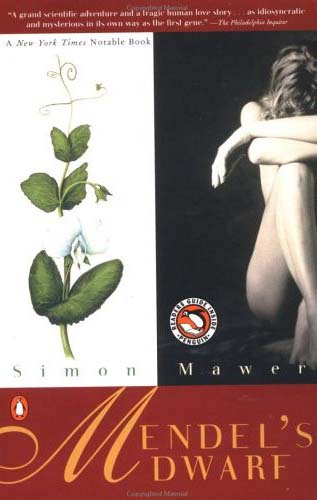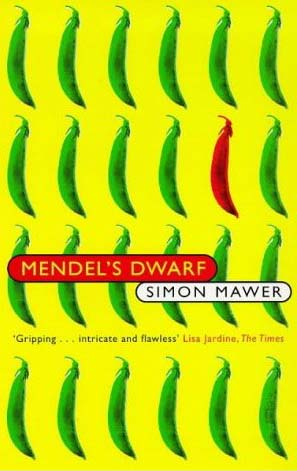|
|
Mendel's Dwarf
first published by Transworld in UK (1997) and Harmony
Books (Crown) in the US (1998), Mendel's Dwarf is Due
to be reissued by Abacus in July 2011.
In the final 10 for the Booker Prize, 1997
A finalist for one of the Los Angeles Times Book
Prizes for 1999
A New York Public Library "Book to Remember,
1998"
Winner of the Italian literary prize Scriver per
Amore, 1998
"...[a] furious, tender, and wittily erudite
book."
The New Yorker
Mendel's Dwarf is a compassionate contemplation of
a life that is, in many ways, terribly unfair. This novel takes us
to the brave new world of genetic science through the eyes and heart
of a man who knows that his own particular strain of humanity will
have no place in it.
Behind the walls of a mid-19th-century Austrian monastery,
Gregor Mendel carried out experiments with garden peas that ignited
the modern science of genetics. More than a hundred years later, Dr.
Benedict Lambert, Mendel's great-great-great nephew, is a brilliant
geneticist, and, ironically, a dwarf. The target of his research is
the single gene that caused him.
Inured to the world's sidelong stares and ill-disguised
curiosity, Ben never expected to find anything approaching reciprocated
love -- until he met Jean. Weaving the life of Ben's distant Uncle
Gregor and Ben's own tender, sardonic, unexpectedly erotic story,
Mendel's Dwarf is a novel that questions the meaning of normality
and sounds the depths of passion in a world that is drifting ever
further from the old moral certainties.
UK reviews
From The Times:
"The internationally famous geneticist Dr Benedict Lambert has
made it his life's work to identify the gene which causes the mutation
achondroplasia - dwarfism. What makes this all the more remarkable
is that Lambert is himself a victim of this error in the genetic code...a
brilliant scientific mind trapped in a deformed and stunted body.
"Simon Mawer's Mendel's Dwarf is a gripping, life and death
exploration of the dilemma (of modern genetics), worked out with painful
precision in the novel's intricate and flawless plot.
"Alongside Lambert's own story Mawer unfolds a parallel one,
equally poignant in its loneliness and disappointment - that of Gregor
Mendel, the father of genetics. . . In Mawer's ingenious tale, Benedict's
life and that of Mendel criss-cross and interweave, heightening the
reader's understanding of both men's minds and of the intricate beauty
of fundamental genetics. It is a tribute to the artistry of Mendel's
Dwarf that they denouement if at once brutally unexpected and yet
at the same time all-too predictable."
Lisa Jardine
From Good Housekeeping (UK):
". . .this tour de force by Simon Mawer. . . told through Lambert's
sardonic voice. . . is a dazzling exposition of ideas - about the
power, fallibility and the abuse of science, the cruelty of nature
and the search for perfection. . . We are treated to explosive asides
concerning eugenics, the problems posed by natural selection, the
nature of fate, the ethics of abortion. . . But Mawer's triumph is
his central character - brilliant, angry, funny and tragic, drawn
with compassion but never pity. Lambert's tone is ironic, but underneath
he's as vulnerable as anyone else. And piercing the layers if a powerful,
achingly told love story."
Sally Feldman
top
From the Sunday Telegraph:
". . .Simon Mawer's important new novel. . . takes us into the
quagmire of this new science. It is, on the one hand, a beginner's
handbook to genetics, with a dwarf as a guide. But the guides constant
pain imbues the book with an extraordinary sense of humanity. . .
The questions the books raises are the questions we and our children
have to face. For this particular erstwhile Catholic schoolboy, it
re-awakened the need for help from a God."
Simon Linnell
From the Daily Telegraph:
"This is a rare read: a scientifically informed, passionately
intelligent novel which is also deeply moving."
Christopher Hart
From the Independent on Sunday:
". . .this dark, funny, bitter. . .novel. . . pock-marked with
rhetorical questions and games between the narrator and his audience.
. . told with the blackest, driest humour, and with irony into the
bargain bucket. . . will make you feel uncomfortable, because Benedict
Lambert is a complicated human being who provokes sympathy, but laughs
in its face. He is ferociously witty. . .and is both an emotional
and physical victim of his disability. Mawer has created a character
we feel for deeply, but who is also very difficult, angry, stubborn
and nasty at times. Real, in other words.
"Mendel's Dwarf presents the ethical dilemmas of modern genetic
research in a love story that lurches from sharp humour to jaw-dropping
sadness and back again in pages. True, there is a lot of science to
get through - but the reader seems to acquire knowledge by accident,
thanks to Mawer's simplicity and wit. I picked this book up on the
beach and got through it without stopping. It is a marvellous read."
Cole Moreton
top
The Paperback edition:
From The Times:
Armchair science is such a common pastime of the literati that it
is a relief to discover a novelist with more than a dilettante's knowledge
of his subject. Mawer is a zoology graduate and his story of Benedict
Lambert - geneticist and dwarf - uses genetics as part of a debate
about eugenics, rather than as trendy intellectual trappings. A serious
novel shot through with laughter, it is also a love story and biographical
portrait. This is an impressive work in both style and substance.
James Eve
US reviews
From The New Yorker,July 13 1998:
...(a) furious, tender and wittily erudite book.
From The New York Times Book Review, Sunday 22nd March:
Double-stranded questions, mingling biology and metaphysics, are
the material from which Simon Mawer has fashioned his thematically
ambitious and witty novel...
Until the novel's final chapters, when the pace accelerates towards
its disturbing conclusion... what keeps us reading is more than mere
curiosity about whether Benedict will win the woman of his dreams
and with stand the temptation to play God... Far more interesting
is the breadth and depth of the narrator's sensibility - his mix of
seriousness and grace, the charm and lack of pedantry with which he
touches on a range of weighty ideas...
...As the novel progresses, we also begin to see how the lens of
genetics refracts the oldest and fuzziest metaphysical debates. Questions
of predestination and free will take on a vertiginous spin when we
substitute the dictatorial gene for an omnipotent God. Benedict's
inquiries into the chemistry of genius recall theological speculations
on the nature of the soul.
Mendel's Dwarf is an odd and affecting literary experiment that keeps
pushing itself and its readers to think harder, go deeper. Simon Mawer
writes beautifully, and the pleasure of his novel comes from the chance
to watch him consider the mystery of the world, to report on the clarity
with which nature speaks to us, at least on the cellular level.
Francine Prose
From The Washington Post, Sunday 22nd March:
From the very beginning of this stunning novel, we know that the
narrator, Dr. Benedict Lambert, is a dwarf... it's hard sometimes
to reconcile Lambert's voice -- sardonic, sarcastic, erudite, incisive,
unbearably clever,and horny as hell -- with the brutal facts of his
physique... but inside this misshapen form is a brilliant mind.
Woven through the novel is the tale of Gregor Mendel... Simon Mawer..knows
Mendel's sad little story impeccably, and he tells it quite beautifully,
embellished with imagined scenes of Mendel with his family, in his
garden, and carrying on a fictitious flirtation with Adelaide Rotwang,
a luscious young hausfrau from town. The passages about Mendel's life,
combined with clear and cogent information about contemporary genetics
(including footnotes and website URLs), add a richness to the novel,
which is at its heart about the vicissitudes of chance as seen through
one randomly cruel toss of the genetic dice...
...it is overall a remarkable performance. Lambert's voice is distinctive,
unique and often downright chilling; it grabs you by the throat and
dares you to admit to your own revulsion, combined with guilty gratitude,
when you see him in all his grotesquerie. And it reminds us, again
and again, of how much about us is due to chance, and how little about
our genes, even at the dawn of the 21st century, we truly understand.
Robin Marantz Henig
top
From the San Francisco Chronicle, Sunday 22nd February:
British writer Simon Mawer takes some formidable risks in his superb
new novel. After all, any author who chooses to employ a dwarf as
his narrator-protagonist is bound to find two powerful ghosts looking
over his shoulder: Oskar Matzerath from Gunter Grass' "The Tin
Drum'' and Oly Binewski from Katherine Dunn's "Greek Love.''
Like Grass' and Dunn's masterpieces, "Mendel's Dwarf'' is intelligent,
ambitious, ferocious. Like Oskar and Oly, Mawer's pint-sized tale-teller
trains an unblinking, appraising eye on human cruelties and political
nightmares, as well as on the quiet interludes where love flourishes,
no matter how unpromising the circumstance. Unlike Grass or Dunn,
Mawer plays down the gothic or grotesque elements in his story...
The book, which marks Mawer's publishing debut in the United States,
is not simply about Benedict's career or his stoic attitude toward
his "curse,'' however. For there is another gene he is after
-- or rather "Jean,'' an institute librarian. Normal to a fault
and blandly irresolute (Mawer cleverly uses these traits to build
up plot tension), Jean Miller increasingly depends on Benedict to
be her confidant as her marriage grows ever more violent, and in the
process Benedict falls in love with her...
Parallel to Benedict and Jean's story is that of Gregor Mendel. Mawer,
sharing his narrator's fascination with this pivotal figure in science,
makes Mendel's life every bit as compelling as Benedict's...
The book's mirror structure and Mawer's brilliant manipulation of
key images and phrases make for an impeccably shaped novel. But technical
finesse can only take you so far. What gives "Mendel's Dwarf''
its rambunctious life is the prickliness of Benedict's voice and fluid
contradictions of his personality...
The novel's thematic concerns are many: the random caprice of the
genetic draw, the slippery path by which the personal becomes the
political, the cruelties latent in the human urge to control and improve,
the all-too-easy dismissal of history's watershed moments by those
who take part in them (the audiences at Mendel's lectures, for instance).
The book's wild card is the role played in it by "that most unfashionable
of emotions, love.'' All of this is brought together with powerful
effect and not a shred of sentiment in the memorable voice of Benedict
who, "squat and bowed'' though he is, makes a grand and enduring
impression. Oly and Oskar, surely, will be glad to have him join their
company.
Michael Upchurch
From the Philadelphia Inquirer, Sunday 1st March
Mawer has discovered his own unique manner of addressing the most
basic, biological questions of heredity and normality...
Unlike most first-person narratives, which tend toward lax self-indulgence
and really ought to be framed through omniscience, Mendel's Dwarf
could hardly be told by anyone besides Lambert. The brittle, bitter,
lush and longing voice belongs to a man furious at the hand fate has
dealt him, simultaneously avid and terrified of playing it for a chance
at winning the undeniable rewards of the flesh. "Nature is what
nature does," he says, and that finally brings up a multitude
of other questions that go beyond biology toward a vaguer and more
ominous definition of humanity. How, for example, could one imagine
that the final result of Mendel's benign experiments might occur a
short distance from the friar's home when genetics gave way to eugenics
during the 1930s and '40s? In no uncertain terms, Lambert points out:
"It was a science that would ultimately lead to the ovens of
Auschwitz."
...Mendel's Dwarf turns... into a remarkable meditation on the line
where inheritance gives way to choice. We are both what we're given
and what we make of it. Religion, history, science, and the ineffable
character of creation all spin through Mawer's double helix of a plot
in a way that, though highly intellectual and often academic, is never
didactic.
...every novel is different, Mendel's Dwarf more so than most. Call
it a hybrid, call it a mutation, it's a grand scientific adventure
and a tragic human love story combined, as idiosyncratic and mysterious
in its own way as the first gene formed out of cosmic dust, the one
that may be described, but that refuses to be explained. As Lambert
himself notices in a moment of highly unscientific modesty, "You
can't come to terms with genius." Perhaps, however, we can recognize
it and give thanks.
Melvin Jules Bukiet
top
From the San Jose MercuryNews, 8th March:
To the rapidly-growing literature of deformity, "Mendel's Dwarf''
is an engaging addition... Simon Mawer, an award-winning British novelist,
has pulled it off with a winning combination of black humor, deeply
felt cynicism over the moral doublespeak of modern science, and an
underlying generosity of spirit.
Without resorting to false sentimentality, Mawer draws us in, makes
us feel Lambert's thwarted passion, then chides us for our insensitivity.
"You can tell nothing from a man's appearance, nothing except
the depths of your own prejudice.'' Shades of the Elephant Man? Not
me, you want to say, but, yes, me... For some, the interposition of
this information with the remainder of the novel will be distracting,
yet the detail does serve to underscore Mawer's basic moral arguments.
And, there is plenty of story here, a drama of love and betrayal,
with modern genetics as the weapon of retaliation.
Mawer does not shy away from the politically incorrect, from the
bitterness and undisguised cruelty that Lambert has developed. And
Lambert is the last person to ask for your forgiveness. "Sympathy
is rank with contempt, fetid with the implication that I, the target,
am somehow less than you, the sympathizer. I have never asked for
it. Never so much as once have I played the poor, sad dwarf, smiling
through his tears.''
Thoroughly repugnant character? Yes and no. Lambert is honest, true
to his pained soul, not to those who would wish him to be what would
make them (and you, the reader) comfortable. Lambert is someone you
will not soon forget.
Unfortunately, the inclusion of so much genetic material, all neatly
presented as counterpoint to the story, gives the book a certain excessive
sense of structure, as though the story's scaffolding were still in
place. And the incessant irony underscoring so much of Lambert's thought
grows a bit thin. But perhaps this is unavoidable -- so much of modern
ethicsis paradoxical and is best treated through the ironical observation.
The juxtaposition of a mutant dwarf and the history of genetics
does provide a powerful metaphor. A dwarf is the physical manifestation
of a single mutation. The rest of us are luckier in that our DNA misinformation
is not visible. Until recently, we have been spared this brutal self-knowledge.
Mawer suggests that, in this age of rapidly proliferating identification
of genetic defects, we will be similar to Benedict Lambert. In our
mind's eye, we, too, will be dwarfs. If you have a serious interest
in where we are headed, and want a good, cynical but moving drama,
read "Mendel's Dwarf.'' If not, don't plead ignorance when the
new genetics arrives at your doorstep.
Robert A. Burton
From the Detroit Free Press, 15th March:
"Mendel's Dwarf" is an improbable, bittersweet and wonderful
novel about the science of genetics and life...
Despite any messages for caution in science and reproductive choices,
"Mendel's Dwarf" is no polemic. Rather it concerns the arc
of a rich but unfair life. Benedict Lambert is memorable not because
of his courage (he discounts bravery if the actor was not given a
chance to select his affliction), but because of his willingness to
peer into the pit on the hope that something better might emerge.
His story will grow and stay with the reader long after the book is
set aside.
Marla Schwaller
top
From the Library Journal, November 15 1997:
Benedict Lambert, the protagonist of this imaginative and intelligent
novel, is the great-great-great nephew of Gregor Mendel and a famous
geneticist in his own right. He is also the dwarf of the title, obsessed
with finding the marker for his condition and haunted by the all-too-easy
assumptions/prejudices achondroplastics face when dealing with society
at large. That a stunted body does not mean a stunted mind, feelings,
or libido is brought clearly into focus through Lambert's relationship
with a "mousy" librarian named Jean. Mawer weaves a story
that is in turns compassionate, erotic, and angry. In telling Bendict's
story, Mawer also tells that of Mendel, a genius who died unappreciated
but who ultimately had a more important impact on the world than even
Darwin. His discoveries provide the base for modern genetic research
and the possibility of identifying markers for disease (and possibly
cures), but they also raise the possibility of our being able to select
particular physical characteristics for our offspring. The ethical
and moral implications are obvious, particularly when brought into
focus through someone whose own strain is likely to have no place
in this brave new world. A wonderfully crafted, thought-provoking
tale in which the science never gets in the way of the story; highly
recommended.
DavidW. Henderson, Eckerd Coll. Lib., St. Petersberg, Fla.
From Booklist December1, 1997:
Few authors write real intellectual novels anymore. Most write to
prove their own acumen, reciting esoterica to satisfy their egos or
titillate fellow travelers. In Mendel, now released in the U.S. after
winning critical acclaim in Britain, Mawer tackles an intellectual
subject as he should: to uplift and enliven the reader. Mawer uses
the complex and fascinating world of genetic research as the foil
for his love story, yet in his hands, the subject becomes earthly,
almost mundane. Benedict Lambert, born a dwarfand the great-great-great
nephew of genetic researcher Gregor Mendel, pursues a career in molecular
biology to uncover the gene that trapped him in a mutated body. Despite
his brilliant mind, his life is a constant struggle for acceptance
from a society that would rather see him as a circus performer. Most
painful, the woman he loves, his colleague Jean Piercy, is devoted
to him in her heart and mind, but she cannot accept his body. Mawer
develops a parallel plot, interspersing scenes with Benedict and imagined
events with his progenitor Mendel, conducting experiments with his
crop of garden peas. Benedict, Mendel, and genetic science create
a unique tension, with clever prose and the author's insight into
human sadness turning it all into something truly profound.
Ted Leventhal
top
|

Abacus paperback cover, 2011
Read an extract...

Penguin US paperback

Brilliant Transworld, UK jacket
|



